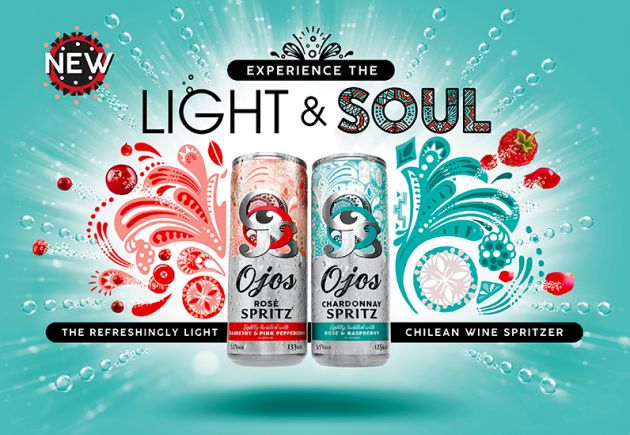
Concha gears up to join ‘wine in can’ category
Concha y Toro (CyT) is poised to become the latest wine producer to turn to the can as the increasingly popular format continues to gather momentum in the UK.
Called Ojos, the new product is a Chilean wine-based spritzer range featuring a twist of natural flavour that complements the base grape variety’s characteristics. It aims to appeal to both spirits and wine drinkers.
With a lowish 5.5% abv, the newcomer (rrp: £2) ticks the boxes that engage younger generations with regard to lower alcohol consumption and is aimed at the under-45 market, where engagement with wine is in decline.
“We have been looking at the market and are prioritising accessibility to drive growth through convenience and meeting a drinking occasion,” said Rebecca Davis, marketing consultant to CyT.
“Spirits are in growth and doing a really good job of being innovative with flavours, and consumers are interested in where the ingredients and brand come from,” she said, adding that wine has been falling behind.
CyT may be one of the bigger players to turn to cans in a bid to expand wine’s appeal, but it is by no means ahead of the curve. A plethora of brands in cans have popped up in recent times – all keen to emulate successes achieved in the US, where the "canned wine” category is booming.
But, to replicate that success, winemakers must continue to embrace the format, says chief executive of drinks design specialist Denomination, Rowena Curlewis, who earlier this year urged winemakers to “stop bottling it and embrace new packaging formats and sizes”.
“Wine consumers want new formats that take into consideration their changing lifestyles and portion needs, so surely more winemakers should provide them. Great design has the power to persuade both winemakers and consumers that the future of wine is in the can.”
Highlighting sustainability as a key benefit of cans, Curlewis added: “Aluminium can be recycled infinitely; it’s lighter and requires less energy to transport. With consumers increasingly concerned about their impact on the environment, this is a major selling point.”
This is echoed by Greencroft Bottling, sister company to Lanchester Wines, which has invested in a large-scale wine canning line – cementing its belief in the future of the ‘wine can’ – from which it is expecting its first production later this summer with an initial focus on 20cl and 25cl slimline formats.
“The can is a format consumers are familiar with, whether through soft drinks, beers or ciders. It’s an uncomplicated packaging solution which resonates across all age groups and lifestyle choices – from the environmentally conscious millennial through to Baby Boomers and Gen X-ers seeking both convenience and variety,” said Mark Roberts, director of sales at Lanchester Wines, which is currently deciding which wines to pour into Greencroft’s cans.
Roberts also stressed the importance of taking into account the changes in how we shop. “Online grocery shopping in the UK is the fastest-growing purchase channel, both in terms of value and growth. Lightweight, versatile formats such as cans are ideally placed to adapt to changing consumer demands – for either manned or unmanned delivery (ie drones or robots, such as Co-op’s Starship robots), these light, shatter-proof formats are perfect.”
Looking ahead to which wines are likely to be available in cans over the next few years, Roberts predicted “many will look to bulk for inspiration”.




